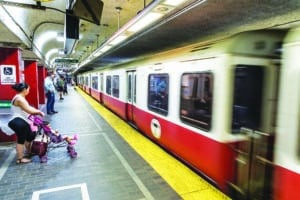Dorchester’s mass transit backbone, the Ashmont Branch of the MBTA’s Red Line, will close for over two weeks in October as the transit agency struggles to contain deteriorating track conditions.
The MBTA announced train service between the JFK/UMass and Ashmont stations and the Mattapan Line light rail service will be suspended from Saturday, Oct. 14 through Sunday, Oct. 29 to give repair crews extended access to the line. Shuttle bus service will replace Red Line service on the route, but the T did not mention whether it would be adding additional service on Dorchester’s Fairmount commuter rail line to give transit users an additional option, as they did during last fall’s Orange Line shutdown.
“Safety of the MBTA system is paramount, and this 16-day closure allows us to address many of the Red Line’s worst speed restrictions much faster than we’ve been able to accomplish during night and weekend work,” MBTA General Manager Phil Eng said in a statement. “We understand service changes can be frustrating, and I want to thank the public for their patience while we perform this critical and targeted work between JFK/UMass and Ashmont Stations and on the Mattapan Line.”
According to MBTA data curated by advocacy group TransitMatters, the Red Line is far and away the T’s worst performing subway line. Slow zones, which are typically implemented to keep trains traveling safely over tracks in various states of disrepair, now add 17 additional minutes to the time it takes to travel from Ashmont to Alewife on the other end of the line going north and 21 extra minutes going south. On the line’s other branch to Quincy and Braintree, slow zones have added 19 minutes northbound travel times and 26 minutes southbound, with the the longest delays on either branch of the Red Line taking place on the Braintree branch between JFK/UMass and North Quincy.
In its announcement, the T said the track in the section being closed is “some of the oldest in the system” and needs to be replaced. The T also promised to repair light fixtures, power-wash and paint some stations as needed during the closure.
Closing the entire section of track will give crews the ability to work “around the clock” and complete six months’ worth of work in 16 days and will let 28 slow zones be removed once the work is done, the T said. In response to a question from Banker & Tradesman, MBTA spokesperson Lisa Battiston said the project’s goal is to return the Ashmont Branch to “regular line speed (the speeds before the restrictions were implemented).”
The MBTA’s Orange Line subway, which it shut down for a month under former General Manager Steve Poftak in 2022 to also do track work, is now slower than it was before that shutdown, TransitMatters data shows.
Correction 9:13 a.m. Aug. 29, 2023: Due to a technical problem, the MBTA’s reply to a question about the Ashmont Branch repairs’ speed was not received the day this story was published. The story has been corrected to reflect that.







